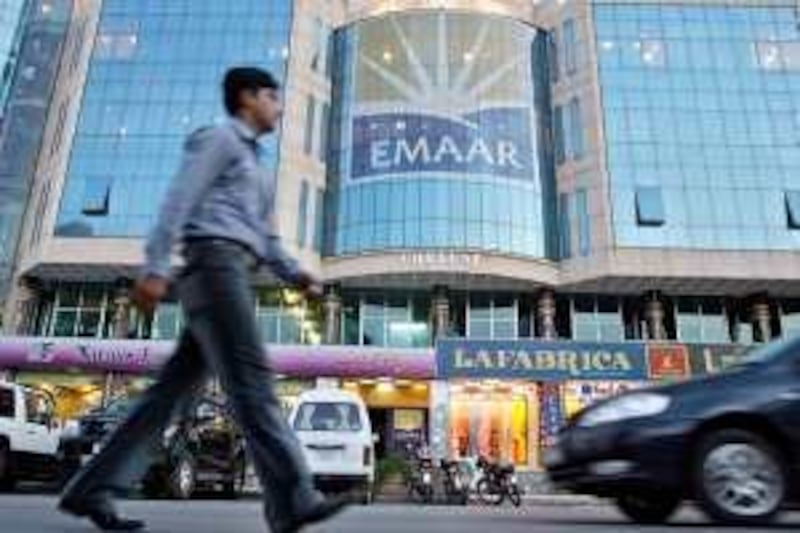Pakistan wants the UAE to invest in its renewable energy, textiles, agriculture, infrastructure and construction sectors. A delegation representing the Pakistan Federation of Chamber of Commerce and Industry (FPCCI) held its first round of meetings on Tuesday with firms such as Aldar and Masdar.
It is seeking investment in more than a dozen projects ranging from hydro, wind and solar-thermal power generation, to corporate farming, textile and property ventures. The group yesterday met Sheikha Lubna Al Qasimi, the Minister of Foreign Trade, in Abu Dhabi and discussed options to enhance trade between the two countries. Issues relating to a free-trade agreement between Pakistan and the Gulf countries were also discussed.
Later the delegation met representatives of the property developers Limitless and Nakheel, Emirates Investment Group, Dubai Islamic Bank, and NBD Capital. It is expected to meet Sharjah and Ajman chambers of commerce and industry representatives, as well as officials from the Dubai Export Development Corporation and the Planning and Development Department, in Dubai today. "We have several attractive options for UAE investors to invest in renewable energy," said Khurram Sayeed, the chairman of FPCCI's standing committee on alternative energy development. "We will pitch several alternative energy projects to firms like Masdar here."
Pakistan said yesterday it would seek US$10 billion (Dh36.73bn) over the next three years from the Friends of Democratic Pakistan group, set up in September to help the nation stabilise its economy. "We have identified priority projects for which we want funds from member countries," said Abdul Basit, a spokesman for the foreign ministry. Mr Basit said the projects would help reduce poverty, meet security challenges and boost human resources development, health and education.
Asif Ali Zardari, the president of Pakistan, will head a meeting of the US-led, 25-member Friends of Democratic Pakistan scheduled for April 17 in Tokyo. Pakistani officials and representatives of member countries and institutions will meet in Abu Dhabi next Wednesday and Thursday to "fine tune" the details of projects, Mr Basit said. The member group includes Australia, Canada, China, France, Germany, Italy, Japan, Saudi Arabia, the UAE, UK, US, World Bank, Asian Development Bank and Islamic Development Bank.
Pakistan needs financial support to revive an economy hurt by political instability and the fight against Taliban militants in the tribal areas bordering Afghanistan. South Asia's second-biggest economy averted defaulting on its debt in November after it received the $3.1bn first instalment of a $7.6bn bail-out by the IMF. Between 2004 and last year, UAE firms have invested about $3.74bn in Pakistan, most of it from the Abu Dhabi Group, an investment consortium.
The Abu Dhabi Group has stakes in the telecoms operator Warid and Wateen, Bank Alfalah Limited and United Bank Limited. The government-owned Etisalat has a 26 per cent stake in the Pakistan Telecommunication Corporation while private equity managers such as Abraaj Capital and Emirates Investment Group have their own initiatives in the country. Already, the property developers Emaar and MAF Investments are building several key projects in Pakistan.
The UAE's Bin Din Group has already signed an agreement with Pakistan to develop the Thar Coal Project in Sindh province. The project, to be completed in three years, would include a mine-mouth thermal power plant with 1,000 megawatts of capacity, said Dr Mirza Ikhtiar Baig, an adviser to Pakistan's president and chairman of the Pak-UAE Business Council. Dr Baig said the project was being developed as a joint venture between the UAE and South Korean firms, but he declined to reveal the size of the investment. "There is a lot of potential of investment in Pakistan's energy sector, which is expected to grow 7.2 per cent until 2010 and 8.8 per cent thereafter," he said.
Pakistan has seen a steep decline in foreign direct investment (FDI) since the beginning of the year. The country's total FDI in the 2007-08 financial year was $5.15bn. It has so far received $2.79bn worth of FDI in the first eight months of the current financial year. Investment from the UAE, which was $299.2 million for the 2007-08 financial year, has dropped to $151.8m so far this year. Most investments in Pakistan in the current fiscal year have come from the sale of large tracts of agricultural land to UAE investors.
"We have so far sold over 50,000 acres (20,234 hectares) of land in parcels to the UAE investors," Dr Baig said. The investors have 100 per cent ownership rights, with subsidies in machinery imports and fertilisers, and permission to export 100 per cent of the proceeds to the UAE, he said. "Al Dafra, one Abu Dhabi Group company, is very actively buying the agri-land for corporate farming and cultivation of cattle feed, alfalfa," Dr Baig said, adding that different provincial governments have set aside land parcels between 404.6 hectares (ha) and 4,046ha for investors.
"At the end of this trip, I expect to bag more deals in agriculture sector than any other." A group including several UAE private and public firms in October last year acquired about 16,187ha of land in Pakistan's Balochistan province for an estimated $40m to begin mechanised farming in the area as part of the strategy to lower food import costs. Dr Baig said Pakistan needed at least $40bn of investments in its infrastructure sector, and firms in the UAE had the right set of skills and finance to fill that niche.
* with Bloomberg skhan@thenational.ae







